BBC's Blog, page 18
June 3, 2013
BBC News Linked Data Ontology
Hi I work with BBC News FM as a data architect, looking at ways that we can use linked data to help users discover relevant News stories quickly and easily on the BBC website.
My colleague Matt Shearer has blogged about some of the prototyping that we have been doing and Oli Bartlett has explained the underlying technology platform that we will be using in the production environment.
In this post I want to talk about how we are starting to embed machine-readable metadata (called RDFa) in the HTML source code of pages on the BBC News website.

Core News Ontology v1
This will help users to find news content about the stories they want to know about and ultimately help to open up references to the data contained in those stories.
The metadata is derived from information added by journalists at content creation time. Although this additional code does not directly impact the user's experience of the page, it makes a big difference to machines, helping them to ‘understand’ that (for example) this page
Is a news articleHas the headline Results for AngleseyWas published at 10:30 on April 29 2013Was published by the BBC
This set of statements can be derived automatically from the content management system that journalists use to create articles, but we can go further.
By journalists annotating articles with statements about the real-world entities that the article mentions or is about and using Uniform Resource Identifiers (URIs) to refer to those entities in additional RDFa statements, we can publish Linked Open Data with every page of the BBC News website.
Using the above example again we state:
The article is about <a BBC unique identifier for Anglesey County Council><this BBC unique identifier for Anglesey County Council> is the same as <dbpedia.org/resource/Isle_of_Angles...To make this metadata available we have used a vocabulary published by the International Press Telecommunications Council (IPTC), a news industry body that works on standards for improved news exchange.
The model is called rNews and provides a simple way of expressing these and other facts about news content in RDFa.
Additionally the rNews vocabulary has been mapped against the widely-used schema.org metadata vocabulary proposed by Google, bing and others.

Initially we have added the automatically generated RDFa statements to all BBC News pages with the intention of assisting search engines and social media sites in their display of BBC News content.
An immediate benefit of this work will be that search engines will be better able to display links to BBC News stories, helping our users to find relevant stories and to determine from a search engine's listings the relevance of the article to the story that they are searching for.
The types of things that an article can be annotated with are defined in the Corenews Ontology, a model that allows us to make simple annotations (content that mention a person) or more complex ones (content about events that took place at a particular location and time).
The additional annotations that describe the real-world entities that the content mentions or is about will be rolled out over the coming months. Currently you can see examples of these ‘about’ annotations on the results pages for each local council in the May 2013 local elections.
Jeremy Tarling is senior data architect for BBC News Future Media.
May 31, 2013
What's on BBC Red Button 2 - 8 June
Lots of outdoor treats on Red Button this week. Springwatch 2013 continues and you can watch live and take a look at how the newborn birds and mammals are doing. In the world of sport, we’ve got the MotoGP at Mugello, Italy and the live action from the Diamond League athletics meet in Eugene, Oregon.
Springwatch 2013

Springwatch 2013
You can watch the Springwatch webcams as we follow the early lives of the UK's best loved animals from the Ynys Hir Reserve in West Wales on the Red Button. Plus there's Springwatch Extra with Ewan McIlwraith. The webcams are live at various times throughout the day on the Red Button and are available daily from 4am to midnight online at bbc.co.uk/springwatch
Available on Freesat/Sky/Virgin Media/Freeview
Sun 2 June, 12.20pm-2.00pm, 2.30pm-5.00pm
Mon 3 June, 12.15am until Tue 4 June, 2.30pm
Tue 4 June, 3.15pm-6.00am until Wed 5 June, 5.20pm
Wed 5 June, 7.25pm until Fri 7 June, 7.00am
Fri 7 June, 9.00am-11.55am, 7.05pm-9.00pm
Strange Hill Extra
Watch exclusive content from the brand new CBBC series Strange Hill High. Strange Hill Extra features a behind the scenes look on the set with Chris and Dodge where they get to see how the show was made. There are some unique character profiles, a sneak peek at what happens in the next episode and plenty of Strange Hill gags in the CBBC Office with Ben and Dodge.
Available on Freesat/Sky/Virgin Media/Freeview
Wed 5th June, 5.20pm-7.25pm
Sport Highlights
MotoGP - The fifth race of the season comes to you from Mugello, Italy and you can catch the qualifying live on the Red Button on Saturday, as well as the free practise and the Moto and Moto3 races on the Sunday.
Athletics - This week the Diamond League is in Eugene, Oregon for The Prefontaine Classic and you can keep up with all the action on the Red Button.
The World Triathlon in Madrid marks the halfway point in the ITU World Triathlon Series and we have coverage of the women’s race on Red Button where leading ladies Gwen Jorgensen and Anne Haug will battle for the top ranking.
For information on timings see the BBC Sport website. Note times are subject to change.
Don't forget you can follow us on Twitter at @BBCRedButton. Answers to frequently asked questions about BBC Red Button can be found on this page .
College of Production Roundup: Sustainable production and radio podcast
I’m Denise Roach, content producer at the BBC College of Production website. Our site is a free online learning resource for the radio, television and online production community offering videos, podcasts and articles from broadcasting innovators and experts.
At CoP we look at how producers and programme makers bring world class content to global audiences every week. This week we go even deeper and look at how technology can impact not just on your production, but on the planet.

Watch a video about sustainable production on the CoP website
We all know it’s our duty to look after the planet in any small way we can, from recycling plastic bottles to cutting down on food waste and that goes for producers and programme makers too. In our latest film BBC Dragon and green champion Deborah Meaden leads the call to action to get producers to think about sustainable production, making programmes with as little negative impact on the environment as possible.
It’s a heartening film inviting producers to revisit their own productions and inspire their teams to follow suit with practical and effective ideas for any producer to follow. From using solar powered generators on remote shoots, low energy lighting on set, to using tools to help you measure the carbon value of all elements of your production - all can help the BBC hit its environmental targets and will help producers save money in the long run, a ‘win win’ all round.

Who is the talent behind the scenes in radio? Find out in the CoP podcast
Your band is in London, your lead singer is in New York and you’ve got to get their live session out on air. How do you make that happen? The unsung heroes of radio production were given the chance to shine this week as we chatted to the talent behind the scenes in our studio manager podcast.
Ian Painter, Bob Nettles and Ian Deeley have a wealth of experience working across both commercial and BBC radio and over the years have seen the role of the studio manager change as digital technology like Skype, Google Hangouts and other emerging communication technology like audio over IP, push the boundaries of what’s possible on radio.
Magical and technically challenging moments like these demonstrate how the skill and experience of a studio manager, married with technical know-how, ultimately glues the production together so that the audience never see the joins. Whether you’re a radio producer or a bedroom based podcast maker, it goes to show that what the audience doesn’t hear counts just as much as your content.
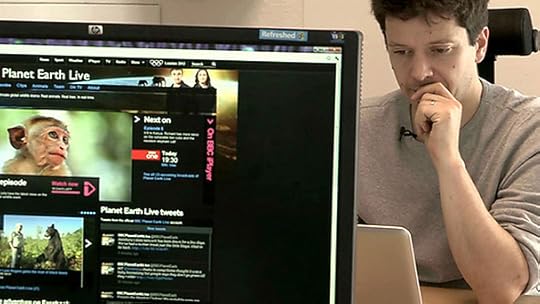
Watch a video about the online producer of Planet Earth Live
And talking of great content, the folks at the Natural History Unit continue to produce world leading programmes and are extending traditional broadcasting to online and social media platforms. A great example is Planet Earth Live. You can see how online producer Paul Deane worked with teams from around the world to make it happen in this film.
Denise Roach is a content producer for the BBC College of Production.
Commonwealth Games: Connected Studio Brief
Hello I’m Mo McRoberts and I’m part of the team that helps to organise Connected Studio events here at BBC Scotland.
As you may know next year the city of Glasgow will play host to the XX Commonwealth Games and part of this is a programme of cultural events across Scotland, revisiting and celebrating the Commonwealth.
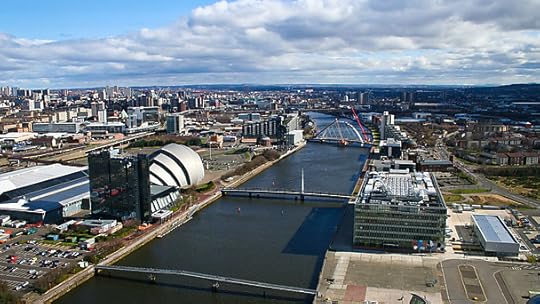
This will be the first Connected Studio to be held solely in Glasgow
It’s this theme of Commonwealth culture which we are exploring with our next Connected Studio event, a Commonwealth Games Creative Studio day which will be taking place at The Lighthouse in Glasgow’s city centre on July 4 2013.
From this Connected Studio we want to uncover how we can bring the history and impact of the Commonwealth to BBC Online, enable audiences to share key moments of the events with one another, provide ways for people to use our archives to tell their own stories of the Commonwealth and how we can encourage under-25s to engage with the BBC and each other in new ways throughout 2014.
Below are the four challenges set out in the Innovation Brief that we are looking to solve through this event. Whether you’ve worked with the BBC previously or not, whether your focus is creative or technical and whether you’re an individual, part of a start-up, or a successful digital indie, if you've got an idea you'd like to pitch at the Creative Studio for Commonwealth Games apply via the Connected Studio website.
These questions formed the basis of the four challenges below, which are set out in the event's Innovation Brief. If you think you can helps us solve them then we'd love to hear from you - Connected Studio is open to everybody, whether you've worked with the BBC previously or not, your focus is creative or technical, or whether you're an individual, part of a start-up, or a successful digital indie.
You can find out more about Connected Studio, or apply to take part in the Commonwealth Games Creative Studio, via the Connected Studio website.
1. Understanding the Commonwealth
The Commonwealth is home to almost one third of the world’s population and its land area comprises one fifth of the world’s total. Member countries are diverse ranging from the largest to smallest and richest to poorest on earth. Here in the UK we catch glimpses of ‘the Commonwealth’ every day in our music, culture, cuisine and history.
During the year in which Glasgow hosts the Commonwealth Games, how could we reflect life throughout the Commonwealth and celebrate the impact of Commonwealth cultures on modern Britain?
2. Accessible Commonwealth Events
Several live events will represent core offerings from the BBC Commonwealth Games portfolio including the Commonwealth Cultural Hub, a publicly accessible venue outside BBC Scotland headquarters in Glasgow which will feature family-friendly content from the BBC and partner organisations. Although the Cultural Hub and other BBC Commonwealth events are taking place in Glasgow, it’s an aspiration that UK-wide audiences should feel involved in as many activities as possible and share their experiences with others.
As Commonwealth events unfold how could we encourage audiences throughout the UK to participate in, and share, the moment?
3. Digital Commonwealth
The 2012 Olympic Games were a success story for delivery of BBC mobile and tablet content and in 2014 we want to deliver even richer digital experiences to audiences. We are looking for ways to make Commonwealth-themed BBC content as interactive, visually inspiring and personally meaningful as possible. We are able to draw upon the resource of the BBC Archive and offer broadcast platforms for content generated by everyone.
How could we encourage audiences to capture, curate and share content from and through the BBC during this Commonwealth Games year?
4. Commonwealth Youth
Over half of Commonwealth citizens are aged 25 or under and reaching youth is a BBC Commonwealth Games editorial priority. Younger audiences are more likely to use BBC digital services than any other age group but during BBC Olympic coverage reach among the 16 to 24 group was lowest. However, half of this age group told us that they used services from the BBC that they had never tried before in order to follow the Olympics.
How could we inspire under-25s to engage with BBC content/services and each other during this Commonwealth Games year?
Mo McRoberts is an Analyst in BBC Archive Development and part of the Connected Studio team for BBC Scotland.
May 30, 2013
BBC Online Briefing Spring 2013: Connected Studio One Year On
Last week my Project Manager Robin Cramp and I presented at the BBC Online Briefing and spoke about the first year of the Connected Studio, what worked well and how we have adapted over time.
Robin also gave an insight into 3 of the pilots that have come out of the programme so far. I also spoke about our new home in Euston square in partnership with UCL and our plans for the future.
In order to see this content you need to have both Javascript enabled and Flash Installed. Visit BBC Webwise for full instructions. If you're reading via RSS, you'll need to visit the blog to access this content
Connected Studio session
Adrian Woolard is head of BBC Connected Studio.
Delegates reaction to the Connected Studio session:
@mattcharles: Session on #bbcconnected at the #bbconline event. Mighty proud of @ShowCasterTV as we are one of 27 pilots from 290 creative pitches.
@turnipshire: Nat language processing and computer vision incorporated into @BBC_Connected pilots. #bbconline (you're doing a great job @crampey!)
@RobSloan: Logging in using a webcam and personal sketch rather than username and password is great. Could we use the same thing for adults? #bbconline
@GinaFegan: Wow! BBC UCL strategic relationship announced with the Connected Studio - real collaboration? #bbconline @d_media_network
You can find out more about Connected Studio by searching the blogs
Connected Studio tag
.
May 29, 2013
BBC Online Briefing Spring 2013: Delivering to Connected TV and The TV Application Layer
At our BBC Online Briefing event in Radio Theatre, Broadcasting House, Paul Caporn and I presented the recently open sourced TV Application Layer which provides the platform for the BBC’s Connected TV strategy.
Following the presentations we had a Q&A session. Here's the film:
In order to see this content you need to have both Javascript enabled and Flash Installed. Visit BBC Webwise for full instructions. If you're reading via RSS, you'll need to visit the blog to access this content
Delivering Connected TV: The TV Application Layer
Peter Lasko is is a technical product manager, BBC Future Media TV and Mobile Platforms.
Delegates reaction to the TAL session:
@WunderRoot : The BBC has released the TV Application layer that powers iPlayer etc: fmtvp.github.io/tal/ #bbconline
@JamesCridland : Impressive seeing BBC open their TV Application Layer. Should encourage better connected TV apps. http://fmtvp.github.io/tal/getting-started/introducing-tal.html
@thoswarner : #bbconline great insight into the BBC TV application layer @TALOpenSource . Write your own iPlayer anyone?
You can read more from Peter about the TAL Application Layer on his previous blog post.
R&D Production Lab: Testing QC Live
My name is Alia Sheikh, I am a technologist at BBC Research & Development (R&D) and have also trained as a director.
BBC R&D often develops new technologies intended for production environments such as new types of camera equipment or studio systems. These need to be tested but it can be expensive and risky to try them out on real life productions.
Instead I run a project called Production Labs which allows R&D to run tests without compromising live productions.
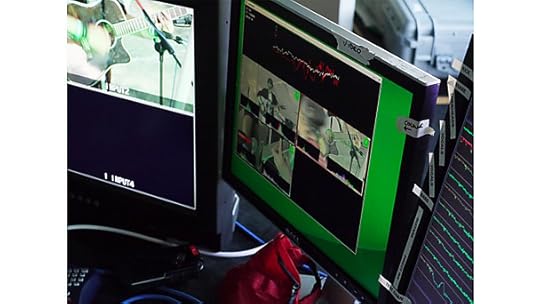
The QC Live tool detects a variety of errors in audio and video streams
Every Lab is designed specifically for the prototype being tested giving us the flexibility to create exactly the right conditions for the test. Or to put it another way, we can test things until they break, something that would normally be unthinkable on a production.
For example, to test a content capture system intended for use in drama productions I would organise a self-contained mini shoot staffed by professionals - a director, actors, camera operators etc - allowing us to gather honest real-world feedback from the people who would be using the technology day to day.
My colleague Jonathan McKinnell recently blogged about the QC Live tool he developed and I’d like to give you a bit more detail about how it was tested in a Production Lab.

Jonathan McKinnell and Mark Glanville setting up the QC Live Tool at the Production Lab
The QC Live tool sits between the captured footage and the video presented to the director, in essence it ‘previews’ the content to find errors in it. If we were to test the tool in a live production there would be no guarantee that the errors we were interested in would occur, certainly not at the rate we wished to test them, and if they did we’d still be unaware of which errors the tool failed to spot.
Jonathan and his colleague Mark wanted to know:
Whether the tool detected the various errors it was trained to notice in audio and video streams.Whether the tool warned of those errors in a timely and helpful fashion.
We decided to carry out the test at Summer Saturnalia, an annual music festival in Skipton which is not usually filmed. The Production Lab guaranteed us an abundance of helpful errors, because we intended to create them ourselves.
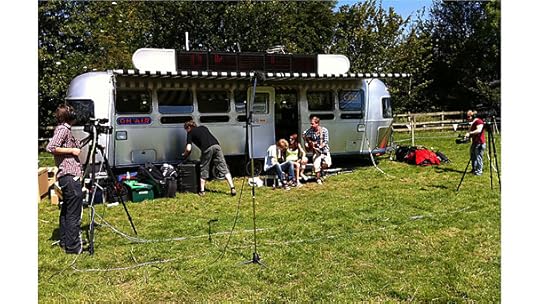
Filming a test performance outside our OB vehicle
The first step was to work closely with Jonathan and Mark to make sure I understood which functions of QC Live they wanted tested. The next step was to run pre-tests in our Television Centre test studio (to check our equipment worked with the festival installation) and then organise the equipment and facilities we needed on location.
I worked with the festival organisers to ensure our tests caused zero disruption to the festival and arranged kit, crew and the necessary health and safety checks.
However, the one part of the organisation I was explicitly not involved with was setting up the schedule of the tests. Jonathan and Mark did this in complete secrecy from me, and for a very good reason. For this Production Lab I would be taking part in the test as the director. I therefore needed to avoid any prior knowledge of the experimental procedure that might have affected my interactions with the QC live tool.

Me in Room one of our OB Vehicle, as the director I was filmed as part of the test
This Production Lab was, to most intents and purposes, an outside broadcast. We arrived with an American Airstream trailer previously kitted out as a radio station. Helpfully for us it had two rooms.
In the first room we set up a gallery with space for a director, a vision mixer and screens showing previews from our cameras as well as screens showing the warnings delivered by the QC Live tool.
There was a camera filming the director and vision mixer so that we could observe their interaction with the tool we were testing. We also recorded the talkback between the director and the camera operators.
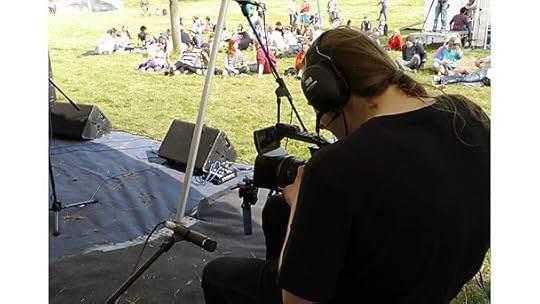
Brandon Butterworth filming the main stage of Summer Saturnalia
In the second room, we set up Ingex – BBC R&D's tapeless content capture system – to record the audio and video streams, an additional screen showing a split-view of all the cameras and the QC Live hardware.
We decided to film some performances error-free (at least without any errors that we were introducing). This would allow us to see what errors might occur naturally. All the other performances we filmed included a series of audio and video errors that Jonathan and Mark explicitly introduced.

Jonathan Fletcher in room two operating the Ingex Tapeless Capture System
During each performance the camera operators took instructions from me about shot framing or camera moves but Jonathan and Mark were also giving the crew instructions which I did not know about.
For example
“Go out of focus two minutes into the performance.”
“Deliberately leave your ND filter on for this set.”
“Mess up your white balance settings as instructed now.”
“Pull out the audio cable.”
“Use a broken SDI cable for this performance.”
This created predetermined errors for the QC Live tool to spot and also allowed us to see whether the director (me!) was able to make good use of the warning messages from the QC Live tool.

The schedule of errors
As the director I found more often than not that I was able to make use of the warnings delivered by the QC Live tool and there were even some interesting occurrences of the tool delivering timely warnings for errors that we had not deliberately put into the captured footage.
The three day test highlighted a number of useful insights. Happily the QC tool behaved as expected, spotting all the errors we threw at it and some we didn’t. However we found that the director’s concentration was unhelpfully split between monitoring the tool and doing their job.
Although the tool worked, it could not be of use if the director forgot or didn’t have time to check it. The test highlighted that the QC Live user interface needed improving so that the warnings showed up as an overlay to the preview from each camera, a feature we subsequently added.

Error warnings delivered to the director and vision mixer
An additional benefit of this Production Lab was that we now own a dataset of errored and error-free live music footage with which we can test subsequent iterations of QC Live and indeed any other BBC R&D algorithms.
We are interested to investigate at which point in the production chain the various functions of the QC Live tool could best be put to use. For example, it is clear that some of the error-spotting features it offers might be of use in-camera as an aid for the camera operator.
It would also be useful to run the tool across pre-recorded footage before an edit to highlight potential ‘trouble spots’ which an editor would be wise to reject from a final cut.
Although this work is still at a relatively early stage in its development we found that testing the tool in a ‘live’ environment allowed us to make improvements that were both faster and more responsive to real-world needs than if we had simply run tests in a lab.
If you have any questions about QC Live or Production Labs Jonathan and I would be happy to answer them. Please leave a comment below or on Jonathan’s previous post.
Alia Sheikh is a technologist in BBC Research & Development.
May 28, 2013
BBC Online Briefing Spring 2013: Keynote
I enjoyed meeting so many of our external partners at last week’s BBC Online briefing. Published below is the speech I gave to kick off the day, which offers some insights into what we’ve achieved over the last year and the challenges that lie ahead.
In order to see this content you need to have both Javascript enabled and Flash Installed. Visit BBC Webwise for full instructions. If you're reading via RSS, you'll need to visit the blog to access this content
Keynote speech
Ralph Rivera is the director of BBC Future Media.
Delegates reacted to Ralph's comments on the plans for premiering content on BBC iPlayer, the success of the Olympics and this year’s Glastonbury coverage:
@theOFDb tweeted: Comedian Peter Kay will debut comedy on iPlayer #bbconline Louis CK started something right...
@steveparks tweeted: BBC is planning to premiere some shows, and have exclusive content such as pilots, on the iPlayer. #bbconline
@GinaFegan tweeted: Glastonbury will get the 'Olympics' treatment - how to avoid the mud!. #bbconline pic.twitter.com/XFiy4HpS5N
QC Live: Quality Control production tool from BBC R&D
My name is Jonathan McKinnell and I work in BBC Research & Development (R&D). For more in-depth information about BBC R&D as well as White Papers about our research take a look at our new website.
One of the challenges facing the BBC is the increasing pressure to produce ever increasing volumes of audio and video content for a variety of different platforms (e.g. for television, PC, mobile and tablet) whilst maintaining high quality.
One aspect of this is the technical quality of the content, from noise levels on microphones right through to whether the video is in focus. Fixing these problems when editing content, i.e. after it has already been filmed or recorded, can be expensive or perhaps even impossible, yet spotting all of the errors during the actual production can be very difficult.

An illustration of where typical errors might occur during content capture
In the programme making chain the later these errors get noticed the more it costs to fix them.
In light of this, R&D trainees Mark Glanville, Tom Cox and I created a tool to warn production staff of potential problems in a live production environment whilst the content is being initially captured, i.e. during a shoot for TV or a radio recording.
Our prototype tool QC Live warns the user about a variety of potential errors from noisy video or unwanted lens effects (like chromatic aberration), through to feedback on audio, right down to warning if a microphone or video feed is completely dead (even if only for a fraction of a second).
QC Live makes use of Open Source code (called OpenCV) incorporating existing academic work on Computer Vision and Signal Processing algorithms whilst also implementing novel algorithms of our own.
One example was an automatic focus detection algorithm which we developed by characterising the statistical properties of video content (inspired by academic work which was originally investigating the cortex of the human eye) and combining this with a technique to spot the blurring of edges in out of focus video.
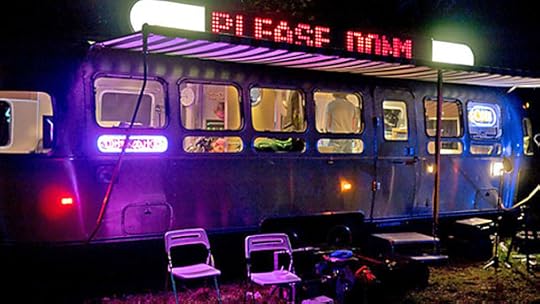
Our portable studio: a vintage American Airstream trailer
We tested the system with an outside live event using an R&D production lab at a small music festival called Summer Saturnalia which took place in a field in Yorkshire. To do this safely for an outside broadcast event we hired a fully kitted out radio trailer which was assembled in a refitted ‘60s burger van!
The warnings were displayed on a live video GUI where each error was highlighted with a separate message appearing as an overlay on the relevant video feed. A similar live display of the audio errors was shown alongside a graphical visualisation of the peak power of the audio.
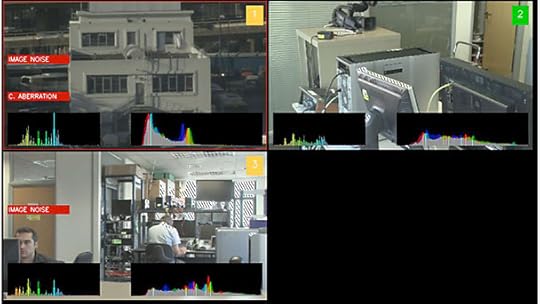
Multi-Camera GUI showing addition of the traffic light system
Results from the test shoot highlighted both the importance of having simpler warning indicators and also the advantages of using existing monitoring equipment to display the warnings rather than adding extra displays (which are less likely to be looked at by staff).
We therefore introduced a traffic light based system of warnings overlaid onto the director’s preview monitor to warn of and summarise any errors occurring during a production.
The traffic light prompts users with a red light when a critical error has occurred (such as a lost feed of video), an amber light when errors which may or may not be critical occur (such as out of focus video) and a green light when all of the quality checks are passed.
You will be able to read more detail about these tests and R&D production labs from my colleague tomorrow.

One of the festival mixing desks with ad hoc labels
Perhaps in future audio warnings could be placed on an audio mixing desk a bit like the makeshift labels above?
We recently presented some of the technical and novel algorithmic aspects of this work in a poster at the government’s SET for Britain event at the Houses of Parliament. It was a fun day which amongst other things involved getting absolutely soaked in the security queue whilst desperately fiddling with a broken umbrella!

Mark Glanville and Tom Cox at the Houses of Parliament
In future we will be pursuing further research into the algorithms themselves (via collaboration with Universities) and looking into possible collaboration with third parties with the goal of creating a robust production tool.
If you’ve got any questions just let me know and I’ll try and answer them.
Jonathan McKinnell is a senior Engineer in BBC Research and Development.
May 24, 2013
What's on BBC Red Button - 25 May - 1 Jun
It's a very special Red Button weekend with coverage from Radio 1's Big Weekend, highlights of the F1 Monaco race and qualifying and final tours of the show gardens of the 2013 Chelsea Flower Show. From Monday, look out for the return of Springwatch's live webcams.
Radio 1 Big Weekend
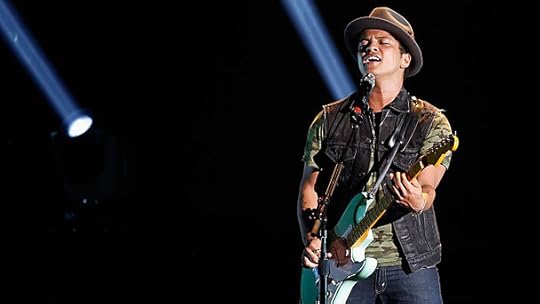
Bruno Mars
The biggest party of the year has kicked off in Derry-Londonderry. You can follow Radio 1's Big Weekend on the Red Button and also on BBC Three, Radio 1, Radio 1Xtra and on the Radio 1 website.
The festival always attracts the big names and this year features the likes of The Saturdays, Bruno Mars (pictured), The 1975, Everything Everything, Wretch 32, Disclosure and Vampire Weekend. Press the Red Button for 'as live' Big Weekend performances on Saturday and Sunday evening (times below). Follow our #bigweekend tweets from @BBCRedButton.
Available on Freesat/Sky/Virgin Media/Freeview
Saturday 25 May: 3.30pm-6pm, 8pm-2am
Sunday 26 May: 5pm-1am
Springwatch 2013 – Live webcams
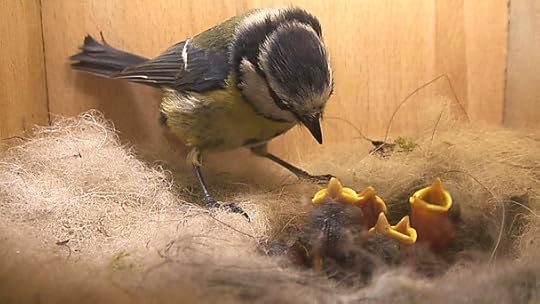
Blue Tit
With the coldest start to spring in 50 years, the UK's plants and animals are facing a real challenge. Join the Springwatch 2013 team as they capture the most dramatic events in nature and celebrate our wildlife. The series returns on BBC Two Monday 27 May and we’re featuring the live webcams from 3.40pm.
Available on Freesat/Sky/Virgin Media/Freeview
Monday 27 May: 3.40pm-11.45pm
Tuesday 28 May: 3.15pm-6am
Wednesday 29 May: 6am-5.50pm, 7.55pm-6am
Thursday 30 May: 6am-11am, 12pm-10.25pm
Friday 31 May: 4am-Saturday 26 May 6am
Sport Highlights
It’s time for the most glamorous race of the F1 season – watch highlights of the Monaco Grand Prix on the Red Button with qualifying highlights on Saturday and Sunday and replays of the race itself on Monday and Tuesday. There’s also Diamond League athletics from New York, Scrum V rugby, Women’s FA Cup replay,and the ever popular Final Score and Football League Show.
For information on timings see the BBC Sport website. Note times are subject to change.
Continuing on the Red Button
RHS Chelsea Flower Show 2013
It’s the final weekend of the Chelsea Flower Show. Take tours of some of this year's larger show gardens – the Red Button coverage includes detailed commentary from the designers on the inspiration and motivation behind their spectacular designs.
Available on Freesat/Sky/Virgin Media/Freeview
Saturday 25 May: 6am-3.30pm
Sunday 26 May: 2.30pm-5pm
Watson and Oliver
Available on Freesat/Sky/Virgin Media/Freeview
Thursday 30 May: 10.25pm-4am
Strange Hill Extra
Available on Freesat/Sky/Virgin Media/Freeview
Wednesday 29 May: 5.50pm-7.55pm
BBC Trust Review of Red Button
The BBC Trust has completed its review of BBC Online and BBC Red Button. Read more about the conclusions and findings here.
Don't forget you can follow us on Twitter at @BBCRedButton. Answers to frequently asked questions about BBC Red Button can be found here .
BBC's Blog
- BBC's profile
- 28 followers



